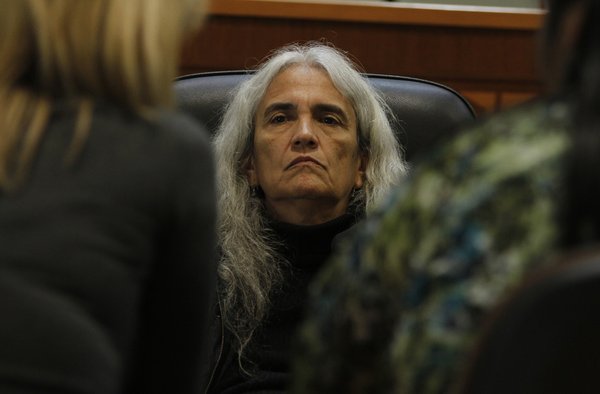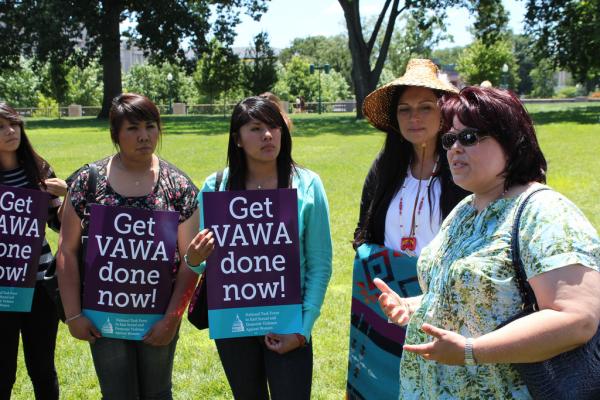August 25, 2013 Anchorage Daily News
By RICHARD MAUER — rmauer@adn.com
Earlier this month, when Edward Parks was convicted in Fairbanks of the kidnapping and brutal assault of his girlfriend, the prosecutor told a Fairbanks reporter it was a victory in the “state’s larger war against domestic violence.”
But three months earlier, with Parks sitting in jail awaiting trial for beating Bessie Stearman so badly he broke three of her ribs and collapsed one of her lungs, the Parnell administration intervened on his behalf before the Alaska Supreme Court. In a case that’s still pending, the state government is seeking to void a tribal court order declaring him an unfit parent.
For Natalie Landreth, a Native-rights attorney representing the adoptive parents of one of Parks’ children, the state’s move was an outrageous example of attaching greater importance to its political fight against tribal rights than the protection of the child, who is now 5.
“Why on earth would you step in to defend someone’s right to access a child when he has just been convicted of almost murdering the mother?” Landreth said.
Attorney General Michael Geraghty said the state is intervening on Parks’ side to protect Parks’ constitutional rights, not get his child back.
“I guess I can understand to a lay person how it might appear that we’re supporting Mr. Parks, but I don’t think that’s the case. We’re supporting his due process rights as we would with any other Alaskan,” Geraghty said. “That doesn’t mean we think he’s a good guy, that he should be a parent or that he’s entitled to custody of his kids.”
Parks has his own attorney to defend his rights and the state’s entry into the case on his behalf was optional, Geraghty acknowledged, but he said the state chose to file its own brief in the Alaska Supreme Court because the case was bigger than Parks.
At issue is whether a small tribal court in the village of Minto, 130 road miles west of Fairbanks, could strip Parks of his parental rights to one of his daughters, named “S.P.” in legal filings, and approve her adoption by Jeff Simmonds, the cousin of the child’s mother, and Simmonds’ wife Rozella. According to court filings, S.P. is a member of the Minto tribe, as is her mother, Stearman, the victim of Parks’ rage. Jeff Simmonds is also a Minto tribe member, while Rozella Simmonds is a Zuni Pueblo Indian from the Southwest.
One of Parks’ parents is Alaska Native and Parks himself is an enrolled member of the tribe at Stevens Village, about 60 miles north of Minto on the Yukon River, according to the court filings.
To the state, that meant that the Minto court was trying to enforce its order against a nonmember of its tribe. The Minto court’s declaration on May 7, 2009, that Parks was an unfit parent was improperly reached, the state said in its brief to the Alaska Supreme Court, filed in April.
The proper venue for that question is before a state judge in Fairbanks, not the elders of the Minto court, the state said.
Landreth, from the Native American Rights Fund office in Anchorage, said the state is overreaching and ignoring the years of legal precedent since Congress passed the Indian Child Welfare Act in 1978.
‘sovereignty issues are current issues’
Alaska, like other Western states with significant Native American populations, has had a contentious history with tribal rights. The federal government recognizes more than 200 tribes in Alaska — most of them small, rural villages — and they form parallel governments to the municipalities under state law, and the state itself — at least for duties and rights granted by Congress. Native rights are based in the U.S. Constitution and in aboriginal-rights doctrine subscribed to by the United States. Tensions over tribal sovereignty have grown or subsided, depending on who was governor and what issues were hot at the time.
“Certainly tribal sovereignty issues are current issues, they’re topical issues, I agree with that,” Geraghty said. But the decision to intervene on Parks’ behalf against the Minto tribal court was about Parks’ legal rights, not an effort by the state to restrict tribes.
Landreth doesn’t see it that way. By declaring that Parks shouldn’t be bound by the tribal court even though his daughter, his daughter’s mother, and one of the adopted parents are tribal members, the state is trying to make new, impractical law, she said.
“The legal term for that kind of argument is ‘Just Silly,'” Landreth said. “Tribes, especially in Alaska, are so small that nobody’s going to marry someone in their own tribe because they’re mostly related within two degrees of blood.”
If both parents have to be members of the same tribe for a tribal court to have jurisdiction under the Indian Child Welfare Act, that would foreclose a decision in almost every case except those involving the largest tribes in the state, like the Tlingit-Haida people, she said.
QUESTIONS OF JURISDICTION
S.P. was born in Fairbanks in 2007. At the time, Bessie Stearman, her mother, was on probation for drug charges, according to the filings with the Supreme Court. By the following January, Parks had been jailed on an assault charge for breaking Stearman’s finger “in a dispute relating to the trimming of S.P.’s fingernails.” The attack came to the attention of a tribal social worker.
In May 2008, with Parks working on the North Slope, Stearman was jailed for probation violations. She asked Rozella Simmonds to care for S.P.
Parks found out, quit his job, and returned to Fairbanks. He learned that the Minto tribal court had granted temporary, emergency custody to the Simmondses, and agreed to that arrangement at least for the time being, though he preferred placing the baby with his mother instead.
Over the course of the next year, the tribe held more hearings and set up a visitation schedule for S.P. with Parks and Stearman. The couple continued in their relationship and eventually had three more children, including a set of twins.
“Yeah, she went back to him,” said assistant District Attorney Andrew Baldock. “As domestic violence cases go, it’s not unusual for that sort of thing to happen.”
Parks got a lawyer, Don Mitchell, an Anchorage attorney who has written extensively about Native law — and who has a problem with tribes as legal entities in Alaska.
Parks demanded that S.P. be returned to him. He accused the tribe of kidnapping her. On May 5, 2009, he “abducted” S.P. from the Simmondses, according to Landreth’s petition. The Alaska Office of Children’s Services, with the help of Fairbanks police, returned S.P. “to her tribal foster home,” Landreth wrote.
Two days later, the tribal court convened again, this time in a hearing to terminate the parental rights of Stearman and Parks. The court met in Minto. Stearman, Parks, Parks’ mother and Mitchell participated over a speakerphone in the Tanana Chiefs Conference office in Fairbanks.
Parks told the court it had no jurisdiction over him. Mitchell wanted to speak on Parks’ behalf, but was told by a “court facilitator” — a clerk of sorts — that lawyers are only allowed to advise their clients and submit written documents, not make oral arguments.
The court allowed the interested parties to speak, went into closed session, and returned with its verdict: S.P.’s parents were unable to provide a “violence-free environment” and were not fit as parents. The child would continue to live with Stearman’s cousin and his wife.
LEGAL PROTECTIONS
Parks and Stearman filed suit in Superior Court in Fairbanks on Sept. 17, 2009, trying to get S.P. back. Mitchell originally represented him. The judge, Paul Lyle, refused Landreth’s request to dismiss the case, ruling that Parks was denied due process by the Minto court.
While the case was kicking back and forth between Lyle’s court and the Alaska Supreme Court, Parks lost control again, this time apparently worse than at any other time.
On Dec. 18, 2011, according to the Fairbanks News-Miner, Parks took Stearman to an area near South Cushman Street in Fairbanks and began beating her. He brought her home, tied her with a belt, and kicked and choked her some more. Parks held her for two days, refusing to take her to the hospital until she promised not to call police.
“There were some very small children that were in the residence,” Baldock, the prosecutor, said in a telephone interview. “She was not physically able to go to the hospital — she had a collapsed lung and a couple broken ribs and the children were just kept in the other room away from her.”
But not S.P. She was safe with Jeff and Rozella Simmonds.
Parks was arrested. On Feb. 9, 2012, a Fairbanks grand jury handed up a seven-count indictment that included two kidnapping charges. Another count was for witness tampering. From his jail cell, Parks continued to try to get Stearman to not testify against him, Baldock said. Parks also used delaying tactics to put off the trial, apparently believing Stearman would change her mind, Baldock said.
It didn’t happen. She testified against him. After a one-week trial, the News-Miner reported, he was convicted Aug. 12 on all counts.
Baldock said he was carrying out state policy to aggressively pursue domestic violence cases under Gov. Sean Parnell and Attorney General Geraghty’s “Choose Respect” campaign.
“I can’t speak anything about the civil stuff,” Baldock said, referring to the state’s role in the Minto tribal case, “but certainly from the attorney general on down, there’s a real impetus in making sure that these kind of cases are handled appropriately.”
The civil lawsuit had ground along as Parks waited for trial in his jail cell in Fairbanks. The state intervened on his behalf April 26.
“Having the government in your corner is certainly a useful situation for any litigant,” said Mitchell, Parks’ attorney. “I viewed it as a helpful development.”
Mitchell had to drop out of the case because he had represented both Stearman and Parks, and they had become adversaries in the criminal case. Each now has their own attorney in the civil case. He still believes it was right to pursue the lawsuit.
“At the heart of this problem is the fact that every single person who lives in a village is a citizen of the state of Alaska who is entitled to have access to the same procedural and substantive protections as any other citizen of Alaska, and that has been thrown out the window in the political enthusiasm for the invention of Indian tribes in Alaska and the further invention of tribal courts,” Mitchell said.
But Landreth said the tribal court got it right years before.
“Respondent now has 43 criminal entries on Court View,” she wrote in 2012 in her second petition to the Alaska Supreme Court, referring to Parks’ record in the state’s on-line court database. “As this case has progressed, the wisdom of the Minto Tribal Court’s decision to place S.P. in the Petitioners’ (Simmondses) stable home has become even more apparent.”
The matter is pending in the Alaska state courts. Parks is due to be sentenced in February.
Reach Richard Mauer at rmauer@adn.com or 257-4345.










